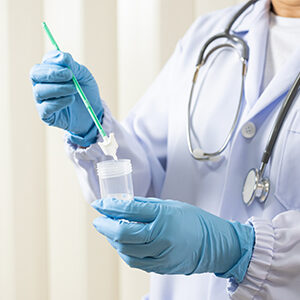Impact of Carbomer-based Lubricants on the ThinPrep® Pap Test
 The Thin Prep® Pap test by HOLOGIC® relies on filtration technology to remove interfering substances and non-diagnostic material from the Pap sample. This filtration technology also is responsible for collecting a sufficient amount of diagnostic material from the sample and transferring it onto the slide, creating a representative monolayer of cells the ThinPrep® Pap test is known for.
The Thin Prep® Pap test by HOLOGIC® relies on filtration technology to remove interfering substances and non-diagnostic material from the Pap sample. This filtration technology also is responsible for collecting a sufficient amount of diagnostic material from the sample and transferring it onto the slide, creating a representative monolayer of cells the ThinPrep® Pap test is known for.
Carbomer-based lubricants do not solubilize well in any fixative solutions.
They impede the Thin Prep® collection process by clogging the pores of the filter; when this happens, the collection process for the TPPT stops prematurely.
Carbomer-based lubricants also interfere with the collection of diagnostic material by competing for space on the filter face.
The end result is compromised cell collection and insufficient material on the slide to make a diagnosis.
Carbomer-based lubricants adversely impact specimen adequacy and elevate Unsatisfactory for Evaluation (UNSAT) rates.
A Pap UNSAT means that the Cytopathologist is unable to make a diagnosis, thus requiring a repeat sampling.
UNSATS are an inconvenience that impact the HCP, lab, and patient, but can be easily mitigated with appropriate Pap collection techniques and by using an approved carbomer-free lubricant like Surgilube®.
SOLUTION: Surgilube® is a sterile, carbomer-free lubricant deemed preferred by Hologic® when a lubricant is necessary.*
Surgilube® has undergone stringent and periodic testing by Hologic® and met established quality parameters without impacting ThinPrep® Pap Test results.
Lubricants can adhere to the filter membrane and may cause poor cell transfer to the slide. If its use is unavoidable, the lubricant should be used in minimum amounts. ThinPrep 2000 System Operator’s Manual. MAN-02585-001, Rev. 005. Marlborough, MA: Hologic, Inc.; 2017
See How Surgilube® Can Improve Your UNSATs
Fill out the form below to request a free sample of Surgilube® Sterile Surgical Lubricant.